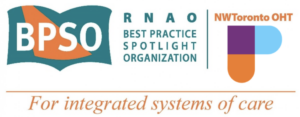Transitioning between stages of care can be overwhelming. Knowing what to expect and what questions to ask ahead of time can help you simplify the process. Here are a few tips to help you through this journey:
Take the time to understand what may change
Transitions often involve new routines, new health or social service providers involved in the person you support’s care, and changes to medications or care needs.
Getting information from the health care team can help you manage the transition and cope with common challenges.
- Medications, including:
- changes to medications and why any changes were made
- how to provide medications (dose, frequency and route)
- side effects to be aware of
- Medical equipment, if needed, and how to pay for it
- Community resources or services
- Follow-up appointments, including:
- where, when and with whom you will meet
- transportation options
- Symptoms or other changes to watch for
- Who to contact if you have questions or concerns
Tell the health care team if you:
- don’t understand the information being shared with you
- need help with transportation to appointments
- need help finding a place for the person you support to stay after the transition
- are worried about how to pay for medications or medical equipment
- don’t have a primary health-care provider to follow up with
- need support to cope with the transition
Source: Transitions in Care and Services, Health Education Fact Sheet from Nurses for You, Registered Nurses’ Association of Ontario (RNAO), October 2023
Learn about the organizations that provide care in your area
Here’s a simple guide to help you:
Hospital provide acute care services, including emergency care, surgeries, and specialized treatments for many medical conditions. The main hospital serving the North Western area of Toronto is Humber River Health, located on 1235 Wilson Avenue.
If the person you support is preparing for a discharge from Humber River Health, make sure you read this document to help you prepare for the next step in care: Preparing for Your Discharge at Humber River Health
Long-term care homes are designed for people who need ongoing care and help with daily activities. Long-term care homes have trained professionals that can care for the person you support. These homes are funded by the government.
To learn more about long-term care homes in Ontario, visit: Long-term care in Ontario | ontario.ca
Retirement homes are usually privately-owned (e.g., residents pay the full cost of the accommodation and services) and offer seniors housing and supported living services. Retirement homes are better suited for people who are still independent and don’t required as much medical care as someone going to long-term care home.
To learn more about retirement homes in Ontario, visit: Find a retirement home | ontario.ca
Home care organizations can help the person you support to receive healthcare and assistance within the comfort of their own home. These services include care coordination, nursing care, personal support, palliative care, and therapy (e.g., Occupational & Physio Therapy, Speech and Language Pathology, Social Work, Dietetics, etc.). In Ontario, these services are coordinated through Ontario Health atHome (formerly Home and Community Care Support Services).
To learn more about these services and how to access them, visit: Ontario Health atHome (ontariohealthathome.ca)
Community support organizations offer a range of programs and resources to help the person you support to maintain their independence and quality of life. These services can include meal delivery, transportation assistance, and social activities.
Community organizations also offer programs that can help you as a caregiver. For example, day programs can help the person you support socialize, learn new skills, or be involved in their community. Day programs are a good option for caregivers that work during the day or need their loved one engaged for a few hours a day. Another important program are respite care programs, these are useful for when caregivers need a break from their caregiving duties. Respite care programs can provide short-term caregiving support.
To find services near you, visit: 211: Help Starts Here | 211 Ontario for more information or connect with your care coordinator to learn how to access services.
You can also visit our section on Programs & Services for the Person you Support for more information
Family doctors, nurse practitioners, and primary care clinics serve as the first point of contact for medical care. If the person you support does not have a primary care provider, you can find one through Health Care Connect.
There are two ways to access this service:
Rehabilitation centres specialize in helping clients recover from injuries, surgeries, or medical conditions. They offer specialized services including physiotherapy, occupational therapy, and speech therapy to help in the recovery.
If you are looking for rehab services the North West area of Toronto, contact:
Palliative and hospice care services focus on providing comfort and support to clients and their families during end-of-life care.
If you are looking for hospice care in the North West area of Toronto, contact:
- The Dorothy Ley Hospice, located in Etobicoke.
- Home and Community Care Support Services
Explore Other Sections
Caregiving 101
Learn About CaregivingPrograms & Services for the Person you Support
Explore Programs & Services The North Western Toronto Ontario Health Team is supported by funding from the Government of Ontario. Our Ontario Health Team is part of the BPSO®️ designation program, funded by the Government of Ontario. For more information about the RNAO BPSO®️ Designation please visit www.RNAO.ca/bpg/bpso.
The North Western Toronto Ontario Health Team is supported by funding from the Government of Ontario. Our Ontario Health Team is part of the BPSO®️ designation program, funded by the Government of Ontario. For more information about the RNAO BPSO®️ Designation please visit www.RNAO.ca/bpg/bpso.